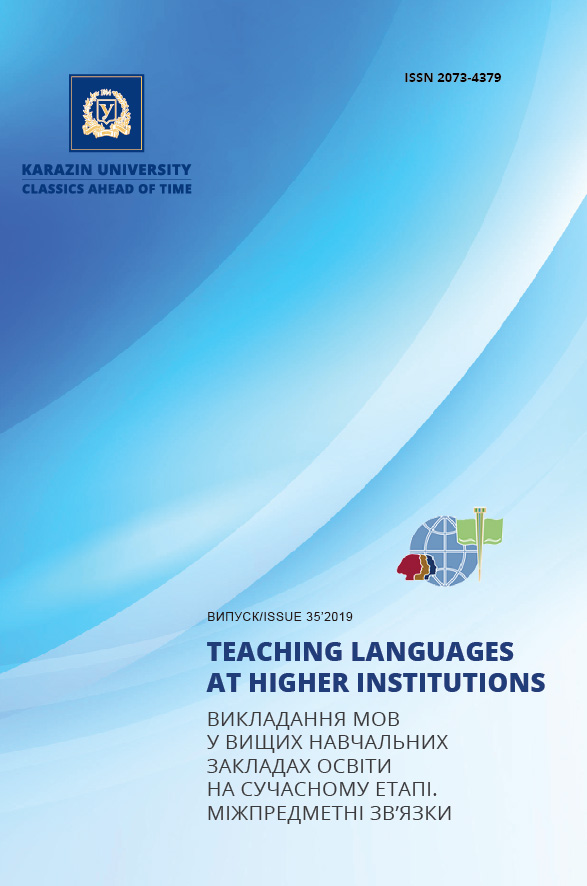Taboo vocabulary in the system of teaching RFL to philologists: linguocultural aspect
Abstract
Today, the linguocultural approach to teaching RFL is considered the most promising and significant. Every culture has words that native speakers avoid either subconsciously or consciously. These forbidden words reflect the cultural characteristics of a particular nation; they are a necessary component of a linguistic personality and are directly related to formation and functioning of a conceptual picture of the world of a particular ethnic group. Mastering a language is impossible without understanding the culture of the people being studied, and taboo vocabulary is, of course, a significant part of our language and culture. The article presents an attempt to consider the taboo vocabulary of the modern Russian language from the point of view of the necessity and the possibility of teaching it in the RFL course for foreign philology students. In particular, there is a change in the causes of emergence of modern speech taboos: if earlier the main reason for taboos was fear, then today we are talking about psycholinguistic changes in society related to the general orientation towards tolerance, providing all members of society with equal opportunities. Nowadays, this is the main reason for the taboo on certain words. In addition, the author argues that taboo topics will not be the same for intra-communication and intercultural communication (as an example, we can talk about negative ethnic stereotypes). Finally, the RFL teacher is asked the question: should a taboo vocabulary be discussed in class with foreign students? And if so, what is the mechanism for teaching “forbidden” words? The author concludes that, despite some exotic themes, knowledge of the vocabulary tabooed in our culture is extremely important for foreign students, as it will help them not in the predictable atmosphere of the university, but in real life. Obviously, in the system of teaching taboo vocabulary, it is advisable to use the system of language and speech tasks, pretext, text and posttext tasks that is familiar to teachers. As an illustration, the author offers samples of several such exercises, noting that not only sentences modeled by the teacher, but also adapted texts of different styles of speech can serve as examples.
Downloads
References
Dembska, K. (2000). Jazykovoe tabu: jevfemizmy i vul'garizmy v sovremennom russkom jazyke [Language taboo: euphemisms and vulgarisms in modern Russian]. Rossica Olomucensia XXXVIII zarok 1999 (Ročenka Katedry Slavistikyna Filozofi cké Fakultě Univerzity Palackého). Olomouc, pp. 235–239 [in Russian].
Gogol', N.V. (1951). Polnoe sobranie sochinenij [Full composition of writings]. Vols. 1–14. Moscow; Leningrad: Izdatelstvo AN SSSR, Vol. 6 [in Russian].
Kashkin, V.B. and Smolenceva, E.M. (2005). Jetnostereotipy i tabuirovannye temy v mezhkul'turnoj kommunikacii [Ethnic stereotypes and taboo topics in intercultural communication]. Kul'turnye tabu i ih vlijanie na rezul'tat kommunikacii [Cultural taboos and their influence on the result of communication]. Voronezh, pp. 246–252 [in Russian].
Kovshova, M.L. (2007). Semantika i pragmatika jevfemizmov: kratkij tematicheskij slovar' sovremennyh russkih jevfemizmov [Semantics and pragmatics of euphemisms: a brief thematic dictionary of modern Russian euphemisms]. Moscow: Gnozis [in Russian].
Krongauz, M.A. Vatniki i ukropy: otkuda berutsja jazykovye tabu i kak ih obojti [Vatniki i ukropy: where do the language taboos come from and how to get around them]. https://theoryandpractice.ru [online]. Available at: https://theoryandpractice.ru/posts/17042-vatniki-i-ukropy-otkuda-berutsya-tabu-i-kak-ikh-oboyti [Accessed 05April 2019] [in Russian].
Krysin, L.P. (2000). Jevfemizmy v sovremennoj russkoj rechi [Euphemisms in modern Russian speech]. Russkij jazyk konca XX stoletija: kollektivnaja monografija pod red. E.A. Zemskoj [Russian language of the late twentieth century: a collective monograph, ed. E.A. Zemskaja]. Moscow: Jazyki russkoj kul'tury, pp. 384–408 [in Russian].
Litvinova, G.M. and Esakova, M.N. (2018). Sootnoshenie normy i uzusa (k probleme prepodavanija kursa “russkij jazyk i kul'tura rechi” v inostrannoj auditorii) [Correlation between norm and uzus (to the problem of teaching the course “Russian language and culture of speech” in a foreign audience)]. Aktual'nye problemy i perspektivy rusistiki. Materialy po itogam Mezhdunarodnoj konferencii rusistov v Barselonskom universitete MKR-Barselona [Actual problems and prospects of Russian studies. Materials on the results of the International Conference of Russian Studies at the University of Barcelona MKR-Barcelona]. Barcelona: Trialba Ediciones, pp. 719–728 [in Russian].
Passov, Y.I. and Kuzovleva, N.E. (2010). Osnovy kommunikativnoj teorii i tehnologii inojazychnogo obrazovanija [Fundamentals of communicative theory and technology of foreign language education]. Moscow: Russkij jazyk [in Russian].
Vorob'ev, V.V. (1999). O statuse lingvokul'turologii [About the status of linguoculturology]. Materialy IX Kongressa MAPRJaL. Doklady i soobshhenija russkih uchenyh [IX Congress IATRLL materials. Reports of Russian scientists]. Moscow, pp. 96–149 [in Russian].

